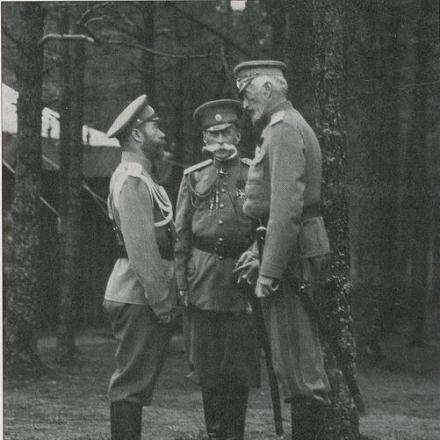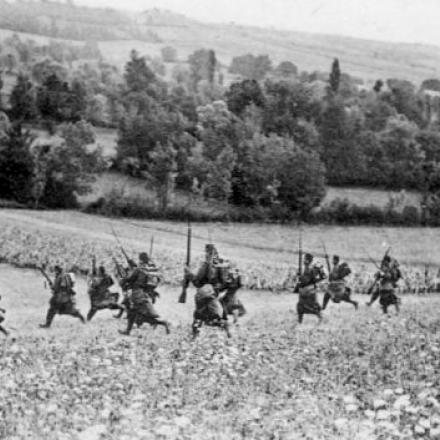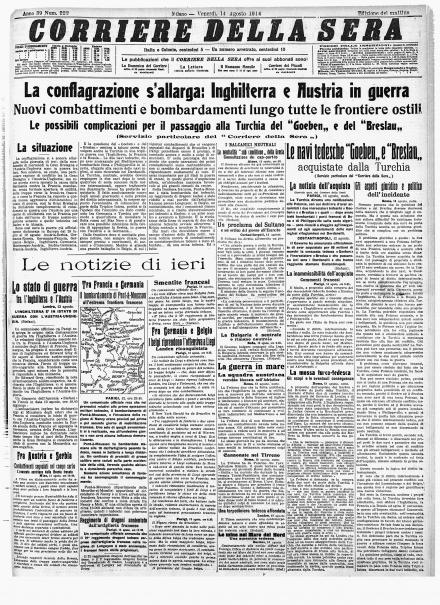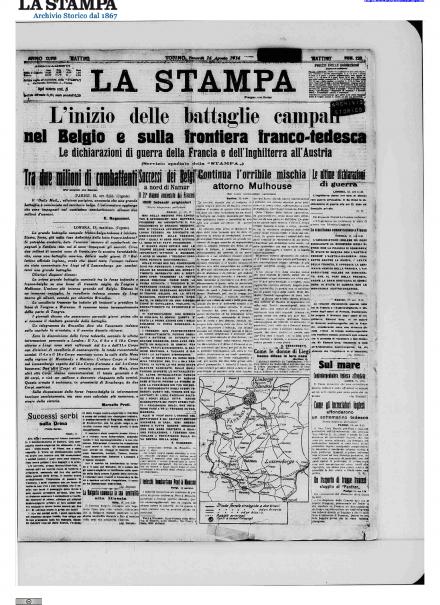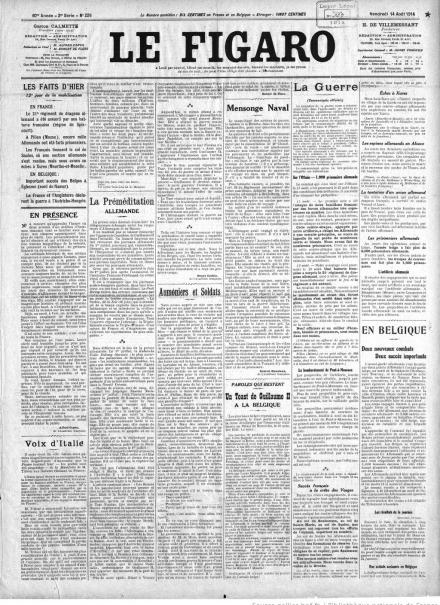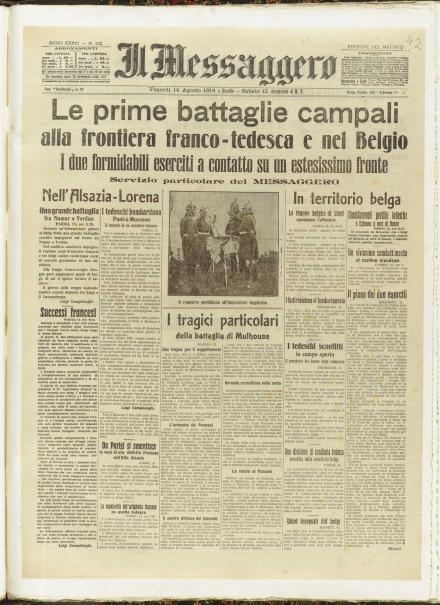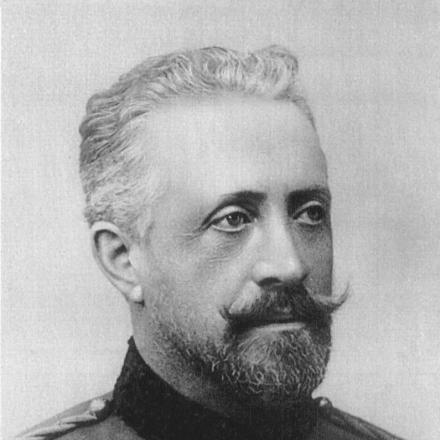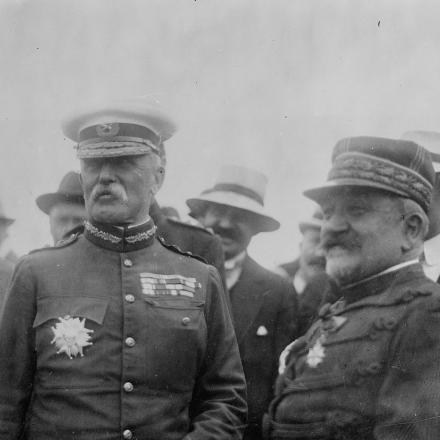Una promessa alla Polonia
Tutti i giornali del mondo aprono la prima pagina con la stessa notizia: Francia e Gran Bretagna dichiarano guerra all’Austria-Ungheria. In realtà il fatto è vecchio di quasi due giorni, ma per problemi di tempo non è stato possibile pubblicarlo prima del 14 agosto. Titoloni a caratteri cubitali più o meno ovunque; escluso il francese Le Figaro. Per motivi ignoti all’umanità, il giornale parigino dedica alla dichiarazione di guerra una misera righetta, in piccolo, al margine sinistro della pagina. La considera grossomodo come una previsione meteo.
Notizie “curiose” se ne trovano. La Stampa racconta l’impegno delle donne a Liegi. Sì, la città è di fatto persa, ma l’informazione viaggia lenta. Signore e signorine, già impegnate nella fabbrica di armi, avrebbero accolto i tedeschi annaffiandoli dalle finestre con acqua bollente.
E poi c’è la triste sorte di Grasselli, celebre intrattenitore. I fatti li riporta la Zeit. In Austria il morale è alto, nonostante i provvedimenti ferrei. Vige una sorta di coprifuoco; ponti e ferrovie sono pressoché interdetti. Il problema è che in pochi si curano delle nuove disposizioni. Grasselli scommette con gli amici: si traveste da donna, avventurandosi su un viadotto. Le sentinelle aprono il fuoco, uccidendolo.
Il 14 agosto i francesi avviano un’offensiva in Lorena. Sul fronte occidentale combattono oltre due milioni di soldati. La percezione della guerra nelle capitali europee è lontanissima dalla realtà: "La prossima battaglia determinerà la fine del conflitto, o quasi". Un “quasi” di almeno altri quattro anni.
Ma il capolavoro del giorno arriva da San Pietroburgo: si vuole scuotere gli animi dei polacchi, popolo diviso dai confini di Germania, Austria-Ungheria e Russia.
Il proclama è allettante. E sarà solo il primo di tanti. Ai polacchi viene promessa l’unità nazionale; la rinascita di una Polonia «libera nella religione, nella lingua e nell’autonomia».
Bello, no? Certo, purché sia «sotto lo scettro dello Zar». Ovvio, c’è sempre la fregatura.
Davide Sartori
GLI AVVENIMENTI
Politica e società
- In Serbia si tengono le elezioni.
- Da Grodno (Hrodna) proclama del Granduca Nicholas, Comandante in capo russo, che promette autonomia alla Polonia.
Fronte occidentale
- Nella notte tra il 13 e il 14 aeroplani tedeschi sorvolano Parigi.
- Battaglia delle frontiere: truppe francesi invadono la Lorena e iniziano un’offensiva nei Vosgi. Cominciano le battaglie di Morhange e Sarrebourg.
- I francesi respingono i tedeschi fino all’Alsazia del nord e bombardano basi aeree tedesche a Metz.
- I tedeschi attaccano Mons e Charleroi, dove i francesi hanno la meglio.
Fronte orientale
- Galizia: i russi sconfiggono gli austro-ungarici a Sokal.
Fronte meridionale
- Serbia: gli austro-ungarici ricacciano indietro i serbi e occupano Loznica.
Parole d'epoca
Granduca Nicholas
Comandante in Capo delle Forze Russe
Proclama ai Polacchi
PROCLAMATION OF THE SUPREME COMMANDER-IN-CHIEF" , GRAND DUKE NICHOLAS
POLES!
The hour has struck for the cherished dreams of your fathers and forefathers to be realized, A century and a half ago the living body of Poland was torn into parts, but her soul did not die.
She lived in the hope that the hour of the resurrection of the Polish nation, of its fraternal reconciliation with Great Russia, would arrive.
The Russian armies are bringing you the glad message of this reconciliation.
Let the boundary lines which have cut the Polish nation asunder be obliterated. Let the Poles be reunited under the scepter of the Russian Tsar.
Under that scepter Poland will be reborn, free in her faith, language, and self-government.
There is only one thing that Russia expects of you, an equal regard for the rights of those nationalities with which history has linked you.
With an open heart, with an extended, brotherly hand, Great Russia greets you.
She trusts that the sword that beat the foe at Grunewald has not rusted.
From the shores of the Pacific to the seas of the North, the Russian hosts are on the march.
The dawn of a new life is breaking for you.
Let there shine forth in this dawn the sign of the Cross, the symbol of the Passion and resurrection of nations.
The Supreme Commander-in-Chief,
General-Adjutant NICHOLAS
La risposta delle forze politiche polacche
The representatives of the undersigned political parties, assembled in Warsaw on the 16th August, 1914, welcome the Proclamation issued to the Poles by his Imperial Highness the Commander in Chief of the Russian forces as an act of the foremost historical importance, and implicitly believe that upon the termination of the war the promises uttered in that proclamation will be formally fulfilled, that the dreams of their fathers and forefathers will be realized, that Poland's body, torn asunder a century and a half ago, will once again be made whole, that the frontiers severing the Polish nation will vanish.
The blood of Poland's sons, shed in united combat against the Germans, will serve equally as a sacrifice, offered upon the altar of her resurrection.
THE DEMOCRATIC NATIONAL PARTY.
THE POLISH PROGRESSIVE PARTY.
THE REALIST PARTY.
THE POLISH PROGRESSIVE UNION.
Parole d'epoca
Sir John French
Generale britannico
I left Charing Cross by special train at 2 p.m. on Friday, August 14th, and embarked at Dover in His Majesty's cruiser "Sentinel." Sir Maurice FitzGerald and a few other friends were at the station to see me off, and I was accompanied by Murray, Wilson, Robertson, Lambton, Wake, Huguet and Brinsley FitzGerald (my private secretary). The day was dark, dull and gloomy, and rather chilly for August. Dover had ceased to be the cheery seaside resort of peace days, and had assumed the appearance of a fortress expecting momentary attack. Very few people were about, and the place was prepared for immediate action. The fine harbour was crowded with destroyers, submarines, and a few cruisers; booms barred all the entrances and mines were laid down.
It was the first time since war had been declared that I witnessed the outward and visible signs of the great struggle for which we were girding our loins. Not the least evidence of this was the appearance of the officers and men of the "Sentinel."
All showed in their faces that strained, eager, watchful look which told of the severe and continual daily and nightly vigil. This was very marked, and much impressed me.
We sailed a little before 4 and landed at Boulogne about 5.30 in the evening. I was met by the Governor, the Commandant, and the port officials, and we had a very hearty reception. There were several rest camps at Boulogne, and I was able to visit them. Officers and men looked fit and well, and were full of enthusiasm and cheer.
Boulogne was only a secondary port of embarkation, but I can vividly recall the scene. Everyone knows the curious and interesting old town, with its picturesque citadel, situated on a lofty hill. On all sides were evidences of great activity and excitement. Soldiers and sailors, both British and French, were everywhere. All were being warmly welcomed and cheered by the townspeople.
The declining August sun lit up sinuous columns of infantry ascending the high ground to their rest camps on the plateau to the sound of military bands. From the heights above the town, the quays and wharves, where the landing of troops and stores was unceasingly going forward, looked like human beehives. Looking out to sea, one could distinguish approaching transports here and there between the ever wary and watchful scout, destroyer and submarine, which were jealously guarding the route.
Over all towered the monument to the greatest world-soldier—the warrior Emperor who, more than a hundred years before, had from that spot contemplated the invasion of England. Could he have now revisited "the glimpses of the moon," would he not have rejoiced at this friendly invasion of France by England's "good yeomen," who were now offering their lives to save France from possible destruction as a Power of the first class? It was a wonderful and never to be forgotten scene in the setting sun; and, as I walked round camps and bivouacs, I could not but think of the many fine fellows around me who had said good-bye to Old England for ever.
We left Boulogne at 7.20 the same evening, and reached Amiens at 9. There I was met by General Robert (Military Governor) and his staff, the Prefect and officials. Amiens was the Headquarters of General Robb, the Commander of our Line of Communications, and it was also the first point of concentration for our aircraft, which David Henderson commanded, with Sykes as his chief assistant. Whilst at Amiens I was able to hold important discussions with Robb and Henderson as to their respective commands.
1914, John French, Viscount of Ypres
